What You Did
Sponsoring OKFestival: Opportunity to Share, Learn & Engage
Stef van Grieken from Google and Duncan Edwards from Making All Voices Count tell us why their organisations decided to sponsor OKFestival 2014. We also find out how meeting the diverse crowd of OKFestival and participating in the event helped their work and upcoming projects.
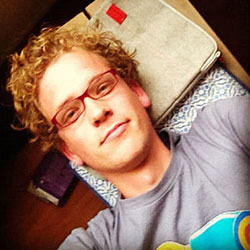
Stef van Grieken
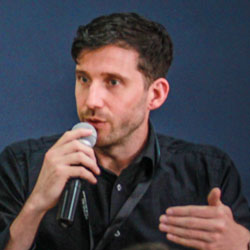
Duncan Edwards
Stef van Grieken is the Technical Program Manager at Google. Duncan Edwards works as Making All Voices Count’s Research & Evidence Programme Manager at the Institute of Development Studies (IDS). Together, they both share their views on why their organisations decided to sponsor OKFestival.
We find out how a donor can make the most of this unique opportunity to engage directly with open communities from around the world. Both Stef and Duncan explain how their position as a donor of the event helps them shape the future of “open” with other leaders and advocate for the progress they hope to achieve.
OKFestival depends on the generous support from sponsors. We are also particularly fortunate in that our sponsors contribute significantly more than just their financial support. At this year’s Festival, all our sponsors were active participants, sharing their experience and perspectives, with practitioners, governments and technologists on the ground. In addition, both Google and Making All Voices Count provided crucial financial and in-kind support while also facilitating innovative sessions and inspiring us with keynote addresses.
As donors are an essential component of the global open knowledge movement and a major actor in the open knowledge ecosystem, it was essential for us to create a space in which the Festival’s sponsors as well as other donors in the space were able to come together and work with the community to set priorities for the future of the movement, develop new projects and partnerships and ultimately strengthen our shared vision.
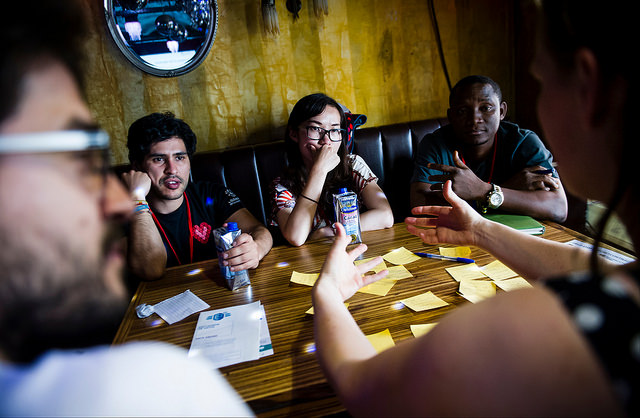
Picture by Gregor Fischer.
Google Does Their Homework (And Some of Ours)
We are grateful for the support from Stef van Grieken, Google’s Technical Program Manager, who joined us as at OkFestival as a faciliator and sat down to talk with us about his experience. In addition to Google’s direct financial support for the open movement through grants and sponsorship, such as their sponsorship of OKFestival, Google, is involved in the open movement in a number of other ways. And while much of Google’s work remains proprietary, there is no denying their generous contributions to open source technology through the countless code contributions of their employees and programmess like Summer of Code in addition to their work on election and crisis data.
Several members of the Google team joined us at OKFestival this year. They mentioned that Google is in the fortunate position to be able to actively research the current state of civic tech and open communities, an opportunity that most organisations working within this space are often unable to dedicate the resources to do. As such, one of their goals is to share some of the insights that they have gained in conducting this research. They were also interested in learning more about the space and work that has been done thus far, aiming to be thoughtful about the contribution that individuals and organisations have given and to gain an improved understanding about what the contribution of Google could be.
In the election data session proposed by DATA Uruguay and co-facilitated with Google’s Stef van Grieken, Global Election Toolbox, there was resounding agreement between the participants that, whereas the community has previously focused on election results, there needed to be more work done in understanding political issues and a greater focus on pre-election data. This session also went into detail about how to get open data in the right shape, for example making sure it’s always machine-readable, and reference to projects which can inspire and support the work of many countries facing similar challenges, like the (Open Knowledge’s!) Open Data Index.
Eric Hysen, who heads up Google’s elections and civic engagement products and programmes, gave a keynote talk with the encouraging title Let’s build the road network of civic tech. The address praised the community efforts and successes reached so far, shared learnings on researches the company is focusing on and at the same time encouraged the community to do more, to look beyond the naive idea of a killer app which solves it all, and get together in trying to figure out the next steps to be taken as a movement to fuel the opportunities offered by civic tech.
Designing for Collective Action, the research-fueled session facilitated by Stef and the Knight Foundation shared stories on how to build civic applications which actually succeed in helping the users. During the last year Google and Knight Foundation have focused on understanding the work and needs of users and developers of civic technology: citizens, governments and civic activists. They took the opportunity to be at OKFestival to connect with a variety of stakeholders working in the field, with the aim of encouraging sharing, discussions and learning from common barriers which governments and civic technologists face in developing their applications. As a result of the session and an eagerness from participants to do more, Google will be publishing a white paper in the coming months with the goal of informing the direction of future research. We look forward to hearing their proposals!
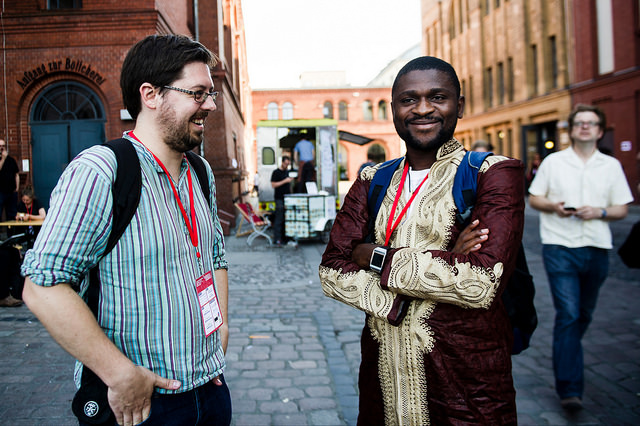
Picture by Gregor Fischer.
Fostering impact with Making All Voices Count
Making All Voices Count is a programme searching for innovative methods to ensure that all citizens can have an impact on their government and affect government decisions. One important route to achieving this is supporting governments to become more open. The open government movement is driven by the assumption that if, for example, government make revenue and expenditure information openly available, citizens will then be able participate in the budgeting process and hold governments accountable for how the money is allocated.
Making All Voices Count’s approach fosters and nurtures new and emerging ideas through learning, financial support, and the brokering of new relationships which are key to their success - Openness is a key element in fostering innovation.
Duncan Edwards, who manages learning and research at Making All Voices Count, is a veteran Open Knowledge Festival participant, having contributed significantly to our last three events. This year Duncan joined our programme team, facilitated a session and helped to organise the Open Development fringe event on the Friday following the festival. According to Duncan, what makes OKFestival unique in that it provides a space to both celebrate the progress and the success that has been achieved in the field while also critically reflecting on how things need to evolve to have greater impact.
Making All Voices Count sees its role as being partly to push open data and technology communities to more actively engage with other communities working on similar issues and to incorporate questions of power, politics and inclusion into what has been, up until recently, a very data and technology focused discussion. While Duncan believes that the discussion has shifted over the years. Compared with the Helsinki 2012 edition of OKFestival, the 2014 OKFestival in Berlin was much more focused on increasing the positive impact of data in the world. He believes, however that there is still progress to be made and ample opportunities for new voices in the space.
Together with Kersti Wissenback of Open for Change, Samantha Custer of Aiddata, and Ben Taylor of Twaweza, Duncan facilitated a discussion on this topic in the Power, Politics, Inclusion and Voice session. The emerging consensus in the session seemed that, as a movement, we need to do better in considering the challenges and risks in utilising data and technology in social change if we want to see the positive impact to which we aspire.
For example, Tim Hughes from Involve, blogged: We think tools are a neutral and positive thing that will bring about change by themselves, but we need to think about it through power and politics. There is a real danger that data and technology just fit into the existing power structures and reinforce the imbalance of power between different groups.
Similarly, Anne Muigai from the Open Institute noted the value of being asked to think beyond just the data. She recognised that simple things such as feelings are often not discussed when we are engaging people around data, and was, as such, pleased to participate in a workshop attempting to address or at least engage with these other issues.
In addition to the session facilitated by Duncan and others, Making All Voices Count also chose to support three other community sessions exploring the major themes of the Making All Voices Count programme, sessions looking at:
- power within under regulated political financial regimes,
- investigating different and creative ways in which voice is expressed
- when opening up has had unintended consequences.
While there was extraordinary value for the Making All Voices Count programme in engaging with the communities working to make data open and usable for all citizens, the Making All Voices Count programme itself is primarily focused on improved governance through improving the relationships between governments and citizens. However, it is precisely for this reason that the Making All Voices Count programme is well placed to push open data and technology communities to think beyond just the technology as it is only by addressing issues around power that we can hope to achieve the intended benefits open data.
A particularly exciting dimension from my perspective, as someone based in a research organisation, is the role Making All Voices Count can play in building an evidence base as to how open data and technology can improve governance. Research is scarce in this area and we would hope a key legacy of the programme is a greater evidence base that can inform and improve practice.
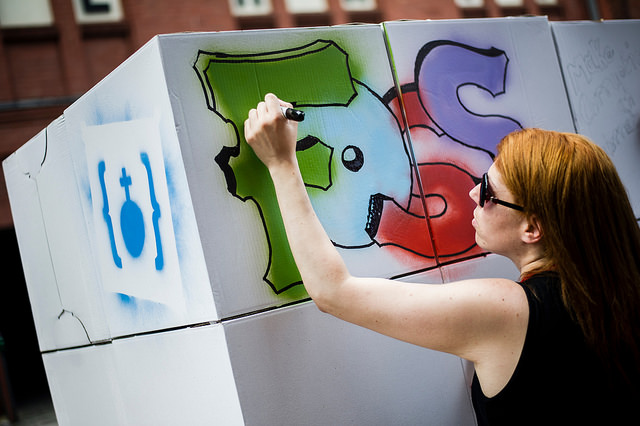
Picture by Gregor Fischer
A key point mentioned by both Stef and Duncan was that their attendance at OKFestival allowed them to connect with a number of people dealing with the same issues that their organisations are also working to tackle. In many ways this is what Open Knowledge hopes to achieve by gathering people together in a shared, collaborative space. One of the key objectives of OKFestival is to break down some of the walls between big organisations and small citizen groups, between “developed” countries and “emerging” economies and between for profit companies and not-for-profit NGOs. We believe it is our different perspectives, different approaches and, at times, different beliefs that equip us to further our shared mission and support each other in changing our societies for the better.